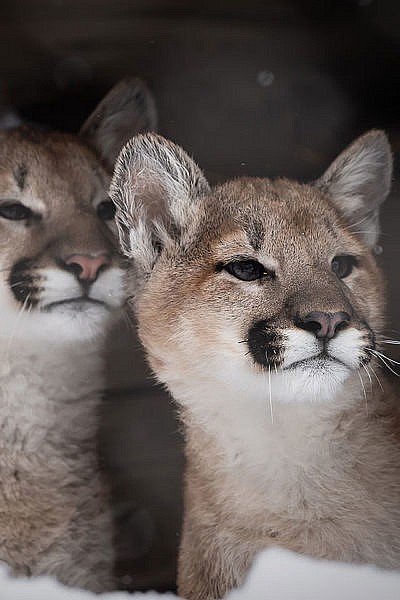Animal Care Teams Address Additional Complications with Female Sibling
COLORADO SPRINGS, Colo. – Cheyenne Mountain Zoo is mourning the unexpected loss of female mountain lion, Sequoia, who passed away Sunday night after post-surgical complications from being spayed.
Because of Sequoia’s sudden, rare and unanticipated reaction to her recovery, veterinary staff suspected one potential cause may have been an allergy to her sutures. With genetic allergies in mind, CMZoo performed an additional examination yesterday on Sequoia’s sister, Adira, who had the same surgery earlier this month. During that examination – which was intended to give us a better look at how Adira is recovering from the surgery – we were pleased with her healing, but we saw, on x-ray, something that looks like wire or rope in Adira’s stomach. Further investigation will be required before we will know whether it may harm Adira.
The object may pass naturally. Adira’s best hope is to avoid another surgery while she’s still recovering from the first one. If the object is dangerous and Adira needs surgery to remove it, the risk of losing her is elevated, no matter what we do.
Sequoia and Adira were spayed on Thursday, Jan. 9, 2020. The surgery requires incisions between the protective muscles on the animal’s abdomen. Although this is a common procedure, any surgery requiring anesthesia is complex and the recovery can run into complications, especially with wild animals that can’t be examined as closely in the days following surgery. Although complications are rare, they are possible, and can be very serious.
The animal care team made the decision to perform spay surgeries on Sequoia and Adira because unspayed big cats are more likely to experience health problems later in life, such as cancer and hormonal imbalance that can cause infection. The mountain lions also needed to be spayed to avoid attracting wild mountain lions to their exhibit during times of estrus, which can be dangerous for animals and our guests. Our third mountain lion sibling, male Sitka, was neutered on the same day that the females were spayed. The neutering procedure is less complex than the procedure for females, and Sitka appears to be recovering well.
“We first noticed swelling around Sequoia’s incision mid-last week, which isn’t unusual,” said Dr. Jon Romano, Cheyenne Mountain Zoo head veterinarian. “We treated her with anti-inflammatory medications and antibiotics and continued daily checks while limiting her physical activity. I personally assessed Sequoia on Saturday night and was satisfied with her progress. Sunday morning, we discovered her surgical site had opened up overnight.”
Sequoia’s team rushed her to the veterinary clinic, where they addressed her complications. She survived the emergency surgery, but remained in critical condition and unfortunately passed a few hours later.
“Sequoia’s passing has shocked us,” said Bob Chastain, Cheyenne Mountain Zoo president and CEO. “Even after 25 years in the profession, this doesn’t get easier. It is a reminder that no medical procedure is simple or without risk. As humans in this day of advanced medicine where miracles are performed every day, this is a sobering reminder.”
Sequoia made an enormous impact in her short life. She brought the CMZoo family and the Colorado Springs community a sense of hope and joy. We welcomed her to the Zoo, as she was taken in after being orphaned with her siblings in the wild. Our hearts melted when the kittens formed a relationship with aging mountain lion, “Grandma” Kaya, in her final months. And now, we mourn her together through this tragic chapter. Keepers will continue monitoring Sitka and Adira through their post-surgery recoveries.
About Cheyenne Mountain Zoo
Cheyenne Mountain Zoological Society was founded in 1926. Today, Cheyenne Mountain Zoo, America’s only mountain zoo, offers comprehensive education programs, exciting conservation efforts and truly fantastic animal experiences. It is Cheyenne Mountain Zoo’s hope that guests fall in love with animals and nature, and take action to protect them. Of the 233 zoos and aquariums accredited by the Association of Zoos and Aquariums (AZA), Cheyenne Mountain Zoo is one of just a few operating without tax support. Cheyenne Mountain Zoo depends on admissions, membership dues, special event attendance and donations for funding.

